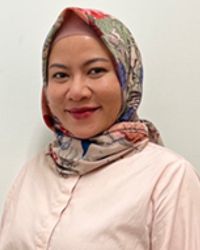Policy imperatives for Indonesia’s AI-ready health ecosystem
By Suci Wulandari
Duke-NUS Centre for Outbreak Preparedness’ Assistant Professor explores how Indonesia can move beyond infrastructure to build a resilient, people-centred digital health ecosystem.

Duke-NUS Centre for Outbreak Preparedness’ Assistant Professor, Suci Wulandari, highlighted the strategy of deliberate investment in multidisciplinary human capital strategy in Indonesia's digital health transformation. Image: Canva
The global race to strengthen health systems post-pandemic has accelerated the push for national digital health transformation around the world. Nowhere is this momentum more evident – or more crucial – than in Indonesia.
As Southeast Asia’s largest nation, Indonesia stands at a critical juncture in its digital health journey – a point underscored at the recent APAC Health and Life Sciences Summit held in Jakarta on June 3.
At the centre of Indonesia’s digital health drive is SATUSEHAT, the national health data integration platform designed to unify health information across public and private providers.
However, infrastructure is merely the first step, and the platform alone will not guarantee transformation. The next phase is more complex – and more human.
If Indonesia's digital and equitable health journey is to truly succeed, it must be powered by a dual strategy: a deliberate investment in multidisciplinary human capital and the concurrent development of agile, ethical governance.
Drawing on insights from the summit, this piece outlines a policy-focused framework for achieving this next complex phase of digital health maturity.
The two pillars of a sustainable digital health ecosystem
The summit brought together leaders from the Indonesian Ministry of Health (Kemenkes), the National Research and Innovation Agency (BRIN), and the Food and Drug Authority (BPOM), alongside regional and global partners.
A recurring theme? A robust system requires more than just technology. It needs people with the right skills and policies that support trust and innovation.
The first pillar is to cultivate human capital for digital health and artificial intelligence (AI). The summit agenda repeatedly highlighted the need to “enhance workforce capacity”. For a digital ecosystem, this extends beyond traditional healthcare roles.
Indonesia would need to cultivate three specialised cadres of professionals:
- Data-literate healthcare professionals: Clinicians and public health practitioners must see data as a core asset for improving patient outcomes and system efficiency.
- Specialised technical experts: In-country health informaticians, bioinformaticians, biotechnologists, data scientists, and AI engineers who can manage the national platform and develop locally relevant AI-driven digital tools.
- Regulatory and ethical specialists: A new group of professionals who are fluent in both technology and policy to navigate the complexities of data privacy, algorithmic bias, and the ethical implementation of AI in health.
Without these human capacities in place, SATUSEHAT risks becoming an underutilised tool to support national health priorities like the National Health Insurance (Jaminan Kesehatan Nasional/ JKN) programme.
To subscribe to the GovInsider bulletin, click here.
The second pillar is to establish agile and ethical governance.
A core theme of the summit was the importance of "strengthening the regulatory environment to support innovation". In the context of digital health, governance is not a barrier but a prerequisite to progress, with a twofold function.
Firstly, it serves to earn public trust. Robust governance frameworks covering data privacy, security, and clear consent models are essential for securing the public trust needed for widespread participation. This trust is the bedrock of a successful data-sharing ecosystem.
Secondly, it enables responsible innovation by providing clear and predictable regulations that private and academic innovators need to invest in developing new digital health solutions.
As articulated by keynote speaker Pharmaceutical and Medical Devices’ Director General, L. Rizka Andalucia, policy support is crucial for innovation in the life science industry.
An agile governance framework must be capable of evaluating and regulating advanced technologies such as AI-driven diagnostics and software as a medical device (SaMD) without stifling development.
SATUSEHAT’s next chapter: Becoming AI-ready
The SATUSEHAT platform represents data unification – a critical first move.
However, the real opportunity lies in leveraging this integrated data for advanced applications that can improve health outcomes.
The next frontier is to make this ecosystem truly AI-ready.
This involves a deliberate policy focus on:
- Data quality assurance: Implementing national standards and audit mechanisms to ensure the data flowing into SATUSEHAT is accurate, complete, and timely enough to train reliable AI models.
- Ethical AI frameworks: Developing specific guidelines for the ethical development, validation, and deployment of AI in the Indonesian healthcare context, with a focus on equity and mitigating bias.
- Local R&D capacity: Creating secure "sandbox" environments where Indonesian researchers can use anonymised health data to build and test AI models that address local health challenges.
The road ahead
Indonesia is well-positioned to become a regional leader in digital health, but success will require sustained and coordinated effort.
Based on the collaborative spirit of the summit, which involved partners from the public, private, and philanthropic sectors, several concrete steps could help accelerate its trajectory:
- Embed digital health into education: The Ministry of Health and the Ministry of Education should collaborate to embed data science, health informatics, and digital ethics into medical and public health school curricula.
- Develop a national digital health and AI governance task force: A cross-sector group comprising representatives from public, academia, patient advocacy groups, and private partners, should co-develop agile regulations for AI and data sharing.
- Leverage international partnerships: Tapping into international and academic expertise to accelerate knowledge transfer in regulatory science, Health Technology Assessment (HTA) for digital tools, and advanced data analytics.
While the technological foundation has been laid, the long-term success of Indonesia's digital health transformation will be determined by its investment in people and principles.

By systematically building its human capital and governance frameworks, Indonesia can ensure its digital health ecosystem delivers a more equitable and resilient health future for its citizens.
The author is an Assistant Professor at Duke-NUS Centre for Outbreak Preparedness.